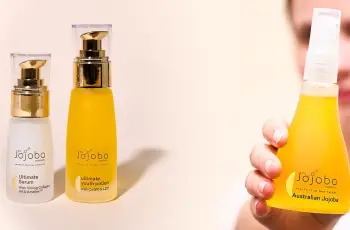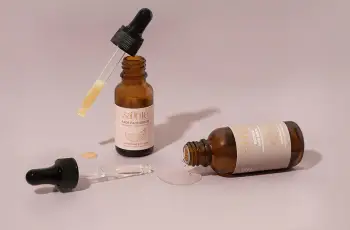
The Best Skincare Routine for Eczema: Complete Guide for All Ages
Eczema is a chronic skin condition that causes dryness, itching, redness, and inflammation. It occurs due to a damaged skin barrier that lets irritants and allergens in and allows moisture to escape.
Living with eczema can be stressful, especially when flare-ups appear on visible areas like the face and hands. These visible patches can impact a person’s confidence and cause discomfort throughout the day.
Creating an effective skincare routine for eczema helps manage symptoms, reduce inflammation, and support the skin’s barrier. A well-chosen routine also helps prevent future flare-ups and protects skin long-term.
Below, we outline the most helpful eczema skincare tips. These suggestions work best for mild to moderate eczema. For severe symptoms, see a dermatologist as soon as possible.
Understanding Eczema and Its Effects on Skin
The outermost layer of skin is called the skin barrier. It’s responsible for locking in moisture and protecting against irritants, allergens, and harmful bacteria.
In people with eczema (also called atopic dermatitis), the skin barrier is compromised. This makes the skin more sensitive, dry, and prone to irritation and infection.
Without proper care, the barrier becomes weaker. This leads to increased itching, scratching, and inflammation, which only worsens the condition.
That’s why choosing the right skincare routine is essential—it hydrates the skin and supports the barrier so it can repair and protect itself.
What’s the Ideal Skincare Routine for Eczema?
There’s no one-size-fits-all solution to treating eczema. Your skincare should be based on your skin type, age, eczema severity, and sensitivity level.
Still, there are general steps you can follow to soothe, protect, and hydrate your skin.
Let’s walk through an effective eczema routine:
Step 1: Choose a Gentle Cleanser
A non-foaming, creamy cleanser is best for eczema-prone skin. It should be free of soap, sulfates, and fragrances. These ingredients can dry out or irritate already sensitive skin.
Best cleansers for eczema-prone skin:
Zerafite Creamy Cleanser – Gentle, non-irritating, fragrance-free
VMV Hypoallergenics Creamy Cleanser – Formulated for hypersensitive and allergic skin
Avoid hot water when cleansing your face or body. Use lukewarm water and gently pat skin dry with a soft towel.
Step 2: Apply a Barrier Repair Moisturizer
Moisturizing immediately after cleansing is key. This seals in hydration and strengthens the skin barrier. Look for moisturizers that contain:
Ceramides, Glycerin, Stearic acid, Cholesterol, Argan oil, Niacinamide
These ingredients mimic the natural lipids in your skin and support barrier function.
Best Face Creams for Eczema
1. Zerafite Barrier Repair Moisturizer
Lightweight but rich in lipids
Contains argan oil, macadamia nut oil, and MLE Technology
Soothes itching, heals dry patches, and prevents scaling
2. Skinceuticals Triple Lipid Restore
Contains ceramides, cholesterol, and fatty acids
Replenishes lost moisture
Vitamin E and essential oils offer antioxidant benefits
Both options support the skin’s natural structure and provide deep hydration.
Best Body Creams for Eczema
1. Zerafite Ultra Rich Body Cream
Fragrance-free and non-staining
Contains skin-identical fats and barrier-repairing ingredients
Works well for both adults and children
2. Avene XeraCalm A.D Lipid-Replenishing Balm
Suitable for very dry and sensitive skin
Contains evening primrose oil and glycerin
Soothes itching, inflammation, and flaking
3. La Roche-Posay Lipikar Balm AP+
National Eczema Association-approved
Contains shea butter, glycerin, and niacinamide
Ideal for hands and body, especially after showers
Step 3: Lock in Moisture and Reduce Inflammation
Hydrating the skin is only part of the solution. You also need ingredients that calm irritation and reduce redness. Helpful anti-inflammatory ingredients include:
Argan oil, Bisabolol, Polyphenols, Niacinamide (Vitamin B3), Gamma-linolenic acid (in evening primrose oil)
These work to calm the immune response in the skin and relieve the urge to scratch.
Step 4: Use Eczema Creams for Specific Areas
For eyelids and eyes:
Choose a safe, non-irritating eye cream. Avoid steroids near the eyes unless prescribed.
For hands:
Use thicker creams like La Roche-Posay Lipikar or Avene XeraCalm Balm. Reapply after handwashing.
For face:
Apply eczema-safe moisturizers morning and night. Avoid fragranced makeup or harsh exfoliants.
Skincare Tips for Children with Eczema
Children’s skin is delicate and prone to irritation. Eczema often begins before the age of 5, so treatment is important to avoid long-term effects.
Top body lotion for children: Zerafite Ultra Rich Body Cream
Free from fragrance and harsh additives
Contains ingredients like glycerin, stearic acid, and argan oil
Suitable for toddlers and older kids with dry, inflamed skin
Apply the cream twice a day, especially after baths, to seal in moisture.
What About Babies with Eczema?
Babies with eczema need special care. Never use soap or foaming cleansers on their skin. Choose mild, fragrance-free, creamy cleansers only. Recommended baby-safe cleansers:
Zerafite Creamy Cleanser
VMV Hypoallergenic Cleanser for Babies
For moisturizing, always use unscented creams free of dyes and preservatives. Apply on damp skin after every bath. Treating baby eczema early may help reduce future allergies and asthma risk.
What If Over-the-Counter Products Don’t Work? If OTC skincare isn’t enough, your doctor might prescribe:
Topical steroids (for short-term use only)
Topical calcineurin inhibitors like tacrolimus (Protopic®) or pimecrolimus (Elidel®)
PDE4 inhibitors like crisaborole (Eucrisa®)
These medications reduce inflammation and are helpful during flares. Avoid long-term steroid use, especially on the face.
Should You Use Cream, Lotion, Ointment, or Oil?
Each form of eczema treatment has its pros and cons. Choose the one that suits your skin and preferences:
Creams: Best overall. Hydrating, less greasy than ointments.
Lotions: Lighter, but often not moisturizing enough.
Ointments: Greasy but lock in moisture best; ideal for nighttime use.
Oils: Great for natural hydration but can be messy.
Pro Tip: Apply oil on damp skin, then seal with a cream for long-lasting hydration.
Ingredients to Avoid in Eczema Products
Stay away from these common irritants in skincare:
Fragrances, Alcohol, Sulfates, Parabens, Essential oils (some can irritate sensitive skin), Always patch test new products before applying them to large areas.
Summary: Building the Right Eczema Routine
To manage eczema effectively:
Use a gentle, creamy cleanser without soap. Apply a barrier-repair moisturizer rich in ceramides and fatty acids. Choose fragrance-free products with anti-inflammatory ingredients.
Treat flare-ups with doctor-approved medicated creams. Be extra gentle with babies’ and children’s skin—less is more. Use the Baumann Skin Type method to personalize your routine.
Eczema can be controlled with the right care. It might take some trial and error, but consistency and high-quality skincare are key.


